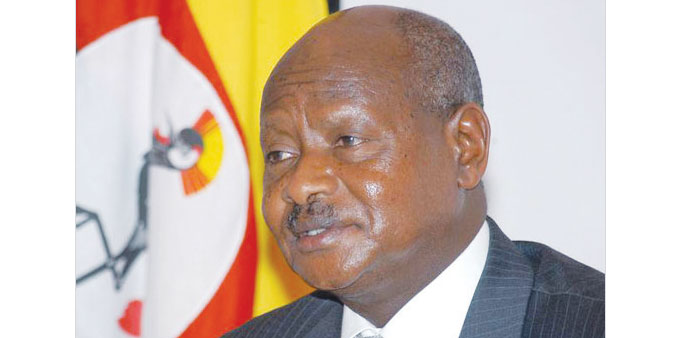|
Foreign donors have withdrawn almost all direct budget support to Uganda over graft concerns, a budget paper shows, with the finance ministry advocating tax hikes to plug the resultant hole in its public finances. |
According to a budget framework paper seen yesterday, direct support from foreign donors to East Africa’s third largest economy will fall by 93% to 50bn shillings ($19.57mn) in the 2013/2014 fiscal year.
At least five western countries including Uganda’s biggest bilateral donor, Britain, have suspended aid to President Yoweri Museveni’s government after allegations $13mn of such money was stolen by officials in the prime minister’s office.
In the paper, the finance ministry projects the economy will grow faster next year and argues that raising taxes might be a better way to narrow the budget deficit than tapping the domestic debt market. Analysts said this may not fill the gap and that spending cuts may be needed.
“The withdrawal of budget support implies that to create the spending room to finance new investments, we will require drastic measures to boost our domestic revenue mobilisation,” the budget framework paper (BFP) said.
Economic growth is projected to accelerate to 5.6% in the next fiscal year, which begins on July 1, from an estimated 4.1% this year.
The BFP, which sets out Uganda’s medium term fiscal policy framework and strategy, said the government would raise taxes on fuel, telecoms and mobile money transactions services to raise about 383bn shillings in additional revenues.
Development partners finance around 25% of Uganda’s 2012/13 budget, though this includes loans and project financing as well as direct budget support.
Some analysts say there is still a chance the government could overturn the aid suspensions in time for the start of the fiscal year but they welcomed moves to boost domestic revenue generation, an area in which the country lags regional peers.
“It is unlikely that revenue increases would be sufficient to cover the shortfall from foreign aid. As such, cuts will be needed in government spending,” said Mark Bohlund, senior sub-Saharan Africa economist at IHS Global Insight.
One Kampala-based fixed income trader said the outlook for Uganda’s economy will be bleak if taxes are hiked and consumers are left with less disposable income.
“On the other hand we’re likely to see domestic interest rates stabilise or decline a little since the government is opting out of domestic borrowing as an option to raise extra funds,” said the trader, who did not wish to be named.
Although Uganda told the International Monetary Fund in February that it planned to raise domestic borrowing to meet the funding gap left by aid cuts, the BFP now argues such a strategy “may not be appropriate” as it would increase the debt burden and impede growth.
“Further borrowing from the market for consumption expenditures is not productive because it will not generate immediate returns that are required to enhance growth,” it said.
The finance ministry projects Uganda’s total public expenditure will rise to 12tn Ugandan shillings in the 2013/2014 FY, from this year’s 11.2tn, with much of the funding funnelled into energy and transportation sectors.
Although the final budget will be announced over the next few months, it is likely that capital expenditure will bear the brunt of cuts if budget support is not reinstated in time for the start of the financial year.
“Any shift from capital to recurrent expenditure (cuts) to cover for suspended budget support will come at the risk of lowering GDP growth in the medium term,” said Bohlund.

